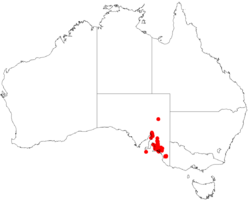Biology:Prostanthera behriana
| Tall mintbush | |
|---|---|
| Scientific classification | |
| Kingdom: | Plantae |
| Clade: | Tracheophytes |
| Clade: | Angiosperms |
| Clade: | Eudicots |
| Clade: | Asterids |
| Order: | Lamiales |
| Family: | Lamiaceae |
| Genus: | Prostanthera |
| Species: | P. behriana
|
| Binomial name | |
| Prostanthera behriana Schltdl.[1]
| |

| |
| Occurrence data from AVH | |
Prostanthera behriana, commonly known as tall mintbush,[2] is a species of flowering plant in the family Lamiaceae and is endemic to the south-east of South Australia. It is an erect to straggling shrub with egg-shaped leaves and white, pale blue, pale violet or purplish white flowers with red-brown spots or purple streaks inside.
Description
Prostanthera behriana is an erect or straggling shrub that typically grows to a height of 1–2.5 m (3 ft 3 in–8 ft 2 in) with flattened, hairy stems. The leaves are egg-shaped, or egg-shaped with the narrower end towards the base, light to mid-green, 13–26 mm (0.51–1.02 in) long, 2–5 mm (0.079–0.197 in) wide and sessile. The flowers are arranged singly in leaf two to fourteen leaf axils near the ends of branchlets, each flower on a pedicel 0.5–1 mm (0.020–0.039 in) long. The sepals are light green and form a tube 2–3 mm (0.079–0.118 in) long with two lobes, the lower lobe 1–1.5 mm (0.039–0.059 in) long and about 2 mm (0.079 in) wide, the upper lobe 2–3 mm (0.079–0.118 in) long and 3–3.5 mm (0.12–0.14 in) wide. The petals are 15–20 mm (0.59–0.79 in), white, pale blue, pale violet or purplish white with red-brown spots or purple streaks inside, and fused to form a tube 7–10 mm (0.28–0.39 in) long. The lower lip has three lobes, the centre lobe spatula-shaped, 6–10 mm (0.24–0.39 in) long and 4.5–9 mm (0.18–0.35 in) wide and the side lobes 5.5–7 mm (0.22–0.28 in) long and 2.5–3 mm (0.098–0.118 in) wide. The upper lip has two broadly egg-shaped lobes 4–6 mm (0.16–0.24 in) long and about 6 mm (0.24 in) wide.[3][4]
Taxonomy
Prostanthera behriana was first formally described in 1847 by Schlechtendal in the journal Linnaea from specimens collected by Hans Hermann Behr.[5][6]
Distribution and habitat
Tall mintbush grows in heath and woodland from the lower Flinders Ranges, through the Mount Lofty Ranges to south of Keith.[2][3]
References
- ↑ "Prostanthera behriana". Australian Plant Census. https://biodiversity.org.au/nsl/services/apc-format/display/109320.
- ↑ 2.0 2.1 "Prostanthera behriana (Labiatae) Tall Mintbush". South Australian Seed Conservation Service. https://spapps.environment.sa.gov.au/SeedsOfSA/speciesinformation.html?rid=3538.
- ↑ 3.0 3.1 Conn, Barry J. (1988). "A taxonomic revision of Prostanthera Labill. Section Prostanthera (Labiatae). 1. The species of the Northern Territory, South Australia and Western Australia.". Nuytsia 6 (3): 377–380. https://www.biodiversitylibrary.org/item/223970#page/105/mode/1up. Retrieved 22 August 2020.
- ↑ "Prostanthera behriana". State Herbarium of South Australia. http://www.flora.sa.gov.au/cgi-bin/speciesfacts_display.cgi?form=speciesfacts&name=Prostanthera_behriana.
- ↑ "Prostanthera behriana". https://id.biodiversity.org.au/instance/apni/540656publisher=APNI.
- ↑ von Schlechtendal, Diederich (1847). "Sudaustralische Pflanzen. II. Bestimmung und Beschreibung der von Dr Behr in Sudaustralien gesammelten Pflanzen.". Linnaea: Ein Journal für die Botanik in ihrem ganzen Umfange, oder Beiträge zur Pflanzenkunde 20: 610–611. https://www.biodiversitylibrary.org/item/109744#page/618/mode/1up. Retrieved 22 August 2020.
Wikidata ☰ Q15355144 entry
 |
